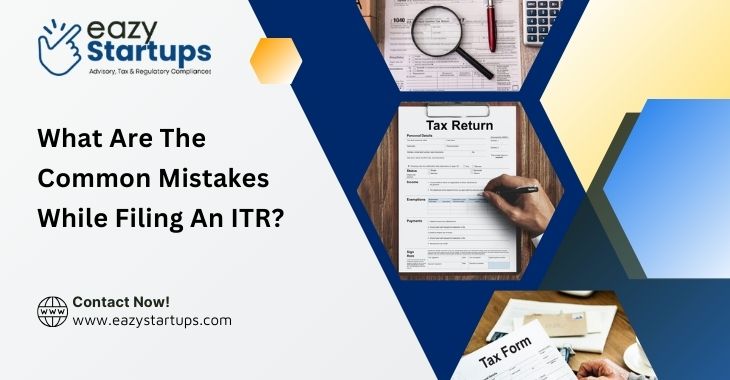The process of filing an Income Tax Return (ITR) can be made simpler by breaking it down into manageable, unambiguous phases. Knowing these procedures can help you report your income accurately and in compliance, whether you are an individual or a business owner. If you are looking for a company that can guide you through online income tax filing in India, then Eazy Startups is the best place for you.
Here is a step-by-step guide:-
1. Gather Required Documents
2. Determine the Applicable ITR Form
3. Login to the Income Tax Portal
4. Pre-fill and Verify Information
5. Claim Deductions and Exemptions
6. Calculate and Pay Taxes, If Any
7. Submit and Verify Your ITR
Gather Required Documents:
Before starting, collect all necessary documents to ensure a smooth filing process.
These include:-
- PAN (Permanent Account Number)
- Aadhaar card
- Bank account details
- Form 16 from your employer
- Investment proofs for deductions (e.g., insurance, PPF, ELSS)
- Details of income from other sources (e.g., interest, rental income)
- TDS certificates
- Organizing these documents will save time and help you input accurate details into the return.
Determine the Applicable ITR Form:
The kind of ITR form you must submit is determined by several circumstances, including your residency status and source of income.
Common forms include:-
ITR-1 (Sahaj): For salaried individuals with income up to ₹50 lakh
ITR-2: For individuals with income from capital gains
ITR-3: For professionals and business owners
ITR-4 (Sugam): For those under the presumptive taxation scheme
Visit the Income Tax Department’s website to identify the correct form for your case.
Login to the Income Tax Portal:
Go to the official e-filing portal for income taxes. Use your PAN to create an account if you don’t already have one.
After registering:-
- Enter your login information.
- Choose the option to file an ITR after navigating to the e-filing section.
- Ensure your contact information, such as your email address and mobile number, is current.
Pre-fill and Verify Information:
The Income Tax Department provides pre-filled forms based on your PAN and Form 16.
These formats could consist of:-
- Details of income from Form 16
- Details of TDS and tax payments
- Personal data
Check all of the pre-filled information and make any necessary updates. Double-check information such as interest income or revenue from other sources to prevent inconsistencies.
Claim Deductions and Exemptions:
Make the most of deductions under various sections of the Income Tax Act:-
Section 80C: Investments in ELSS, PPF, NSC, etc. (up to ₹1.5 lakh)
Section 80D: Medical insurance premium
Section 24(b): Interest on a home loan
Section 10: HRA and other exemptions
Input these details in the appropriate sections to lower your taxable income.
Calculate and Pay Taxes, If Any:
Determine your tax liability after entering all of your income and deductions. The portal will calculate this for you.
If you discover that more taxes are due:-
- Use the e-Tax Payment System’s Challan 280 to make the payment.
- In the ITR form, provide the payment information (challan number, BSR code).
- Ensure the e-filing site and your bank account are properly connected if a refund is pending.
Submit and Verify Your ITR:
Check all the information for accuracy after completing the form.
The following submission:-
- Use a digital signature, net banking, or an Aadhaar OTP to e-verify your return.
- Alternatively, within 120 days, deliver a signed hard copy of the acknowledgement (ITR-V) to the Centralized Processing Center (CPC) in Bengaluru.
The filing process is finished with verification. For your records, retain a copy of the acknowledgement.
Concluding Words
In addition to being required by law, filing your income tax return on time keeps your finances structured. You may guarantee correct and hassle-free filing by following these steps. To prevent mistakes that could result in penalties, seek advice from a tax expert if unsure about any issue. If you need a company that provides online income tax filing in India, then contact Eazy Startups.











Recent Comments